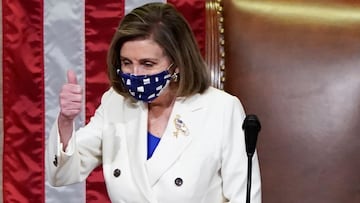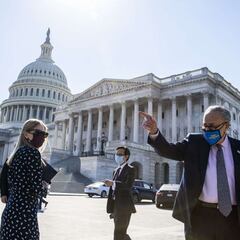Are unemployment benefits included in the new relief bill package?
On Friday, President Joe Biden is set to sign off on the $1.9 trillion American Rescue Plan, which includes several measures aimed at helping out-of-work Americans.

Joe Biden’s $1.9 trillion American Rescue Plan got Congress’ final approval on Wednesday, as the House of Representatives passed the bill in a 220-211 vote split along party lines. Just one Democrat, Jared Golden of Maine’s 2nd congressional district, joined all of the lower House’s Republican representatives by opposing it.
With the bill now having passed the Senate and the House, it will now be sent to Biden’s desk to be signed into law by the president on Friday, paving the way for the IRS to start sending out the much-anticipated $1,400 stimulus checks as early as next week. The $1,400 check is the third stimulus payment to be approved by Congress since the start of the pandemic, following the $2,000 and $600 payments made last April 2020 and January 2021, respectively.
Another important feature of the bill is the extension of the additional $300-a-week federal unemployment benefit until 6 September. The current phase of the enhanced federal unemployment benefit is set to run out on 14 March, which is why Democrats were eager to get this latest bill signed into law before then.
Checks are on the way. pic.twitter.com/rtODFOZ4OX
— President Biden (@POTUS) March 10, 2021
When will $300 unemployment benefit arrive?
However, as CNN reports, while the $1,400 stimulus payments are set to reach people's bank accounts within days of Biden signing the bill, the extension of federal unemployment benefits may take a few weeks – or, in some cases, a few months – to arrive. How long it will take out-of-work Americans to start receiving the extended $300 benefit will very much depend on which state they live in.
As more than 11 million Americans will start seeing their enhanced federal unemployment benefits expire on Saturday, state governments are being urged to process the distribution of the $300 payments as quickly as possible. Some states have already indicated they are ready to move fast once the bill is signed into law.
"If President Biden signs the bill soon and there are no additional program requirements in the bill, we should be able to implement the extensions without any interruption in payments," Kersha Cartwright, a spokeswoman for Georgia's Department of Labor, told CNN. "That is a lot of assumptions, though."
Oregon is also ready, with Melanni Rosales, communications director of the state’s Employment Department, telling the same news outlet: "Our goal is to minimize any delays or disruptions for Oregonians who are relying on these critical benefits.”
- White House expects IRS to start issuing checks in March
- Biden set to sign American Rescue Plan into law
- House passes Protect the Right to Organize Act
$300 unemployment benefit: most states could pay within 3 weeks
While other states could be slower to get the new phase of $300 federal payments out, reports are that the majority will start sending out the jobless benefits in less than three weeks, as was the case back in January.
Related stories
Following the last extension of the $300 benefits in January as part of the $900 billion stimulus bill signed into law by former president Donald Trump, many states were able to process the payment within two weeks. However several others took significantly longer, including Kansas, Colorado, Utah, Nebraska, Wisconsin, Illinois and Mississippi.
Other measures in Biden’s stimulus bill
Aside from the $1,400 stimulus checks and the extension of the $300-a-week federal unemployment benefit, here are some of the other highlight measures of the bill:
- Increase in the child tax credit from $2,000 to $3,600 for children up to 6 years old, and $3,000 for children between 6 and 17 years old
- $45 billion to help low-income households that have lost jobs pay rent, mortgages and utility bills
- $160 billion for vaccine and testing programs
- $360 billion in aid for state, local and territorial governments
- $170 billion to help schools open

